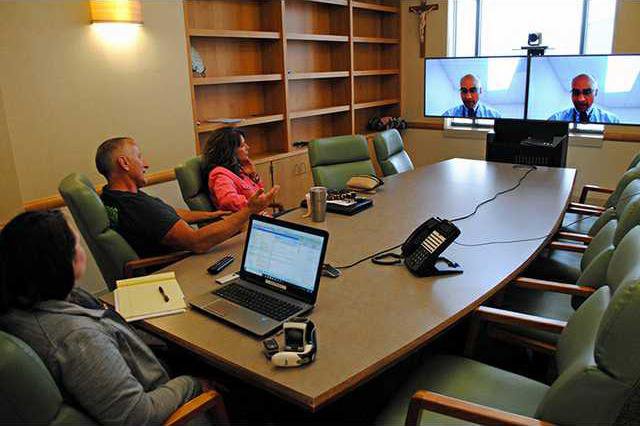It started in late January as an ounce of prevention for Brian Mitchell. The Great Bend businessman, who has operated Pro-Green Total Lawn Care for the past 23 years, scheduled a colonoscopy during his off-season, several months ahead of his 50th birthday, and that required routine bloodwork. But irregularities were found, and further testing showed the presence of myelocytes and metocytes.
Soon after the follow-up blood tests, Mitchell was lying in a Central Care Cancer Center exam room in Great Bend where medical oncologist Dr. Mark Fesen felt his enlarged spleen. Given his findings, Dr. Fesen recommended a blood cancer specialist at the Sarah Cannon Cancer Institute at HCA Midwest Health to be involved in Mitchell’s diagnosis and treatment. A day later, on Good Friday, Mitchell and his wife Julie traveled to Kansas City and met with Dr. Suman Kambhampati, co-medical director of the Blood Cancer Program at Sarah Cannon HCA Midwest Health, located at Research Medical Center.
Further testing revealed that Mitchell has Myelofibrosis, a bone marrow disorder that disrupts the body’s normal production of blood cells. The disease is an uncommon type of chronic leukemia. Currently, Mitchell is being treated by both doctors through the use of telemedicine, allowing him to remain in Great Bend for his care. He is taking a Ruxolitinib medication, which blocks certain enzymes in his body affecting blood cell production, and that should help to reduce his spleen size. His bloodwork is monitored weekly.
“Myelofibrosis has long-term indolent nature, so it lends itself to telemedicine,” explained Dr. Fesen. “When you are largely looking at blood conditions and blood situations, management of care is based on symptoms and how the patient is doing. Telemedicine allows Brian to be seen back and forth frequently between myself and Dr. Kambhampati. The ... use of telemed allows information to transfer much more quickly in effectively treating and monitoring his condition.”
Telemedicine, also referred to as telehealth, allows health care professionals to evaluate and treat patients in remote locations using telecommunications technology, such as Interactive Television (ITV), which Central Care utilizes at 10 locations throughout Kansas and southwest Missouri. HCA Midwest Health is also wired for connectivity, making communication between the two practices a seamless effort for patients and providers.
For Mitchell, the use of telemedicine means he can remain at home and continue to maintain some sense of normalcy, given his frequent doctor visits. It allows him to also focus on running his business during its peak time.
“It’s invaluable and reassuring having the teamwork of doctors that I have for my diagnosis and care and allowing me to stay in Great Bend,” said Mitchell. “If we had to travel to Kansas City, it’s an entire day every single week away from work.”
Only recently have Central Care Cancer Center and Sarah Cannon HCA Midwest Health teamed up to provide telemedicine options for patients. In the first four months of this year, Central Care and Sarah Cannon HCA Midwest Health have coordinated approximately 50 cases, more than double the amount of telemedicine provider visits Central Care scheduled all of last year.
“It’s fantastic working with HCA Midwest Health,” said Dr. Fesen. “They are the utmost professionals, so they always provide a great service to the patients.”
Still in fact-gathering mode about his condition, Mitchell relies on his team of medical doctors, along with his two brothers, Alan and Darin, both doctors in chiropractic care. While Myelofibrosis does progress, it is possible to live with the disease and be symptom-free for years. Telemedicine provides hope to Brian that he will be able to stay close to home and receive the best course of treatment for years to come.
“We don’t have any intention of ever leaving Great Bend,” said Mitchell. “This is our home, this is where we are rooted. We’re not ever moving, but could we be involved in a trial somewhere, and could it be administered in Great Bend? These are all questions that we are asking in order to make informed decisions about our future.”
For now, the couple along with their adult son, Dillon, who also lives in Great Bend and co-owns Pro-Green and Mitchell Motors with Mitchell, are taking steps a week at a time.
“Everything right now depends on Brian’s lab work every week,” explained Julie, “how his white and red blood counts are doing.”
“I’m changing from week to week,” added Mitchell, “but I feel exceptionally good and I think we are on the early with this disease. I’m not giving up. I’ve poured on the nutrition, I’ve changed my diet and I’m exercising. I’m trying to win at this, so I’m going after it. I pray that God and modern medicine will heal me.”
Teaming up with Telemedicine
Central Care Cancer Center coordinates treatment





